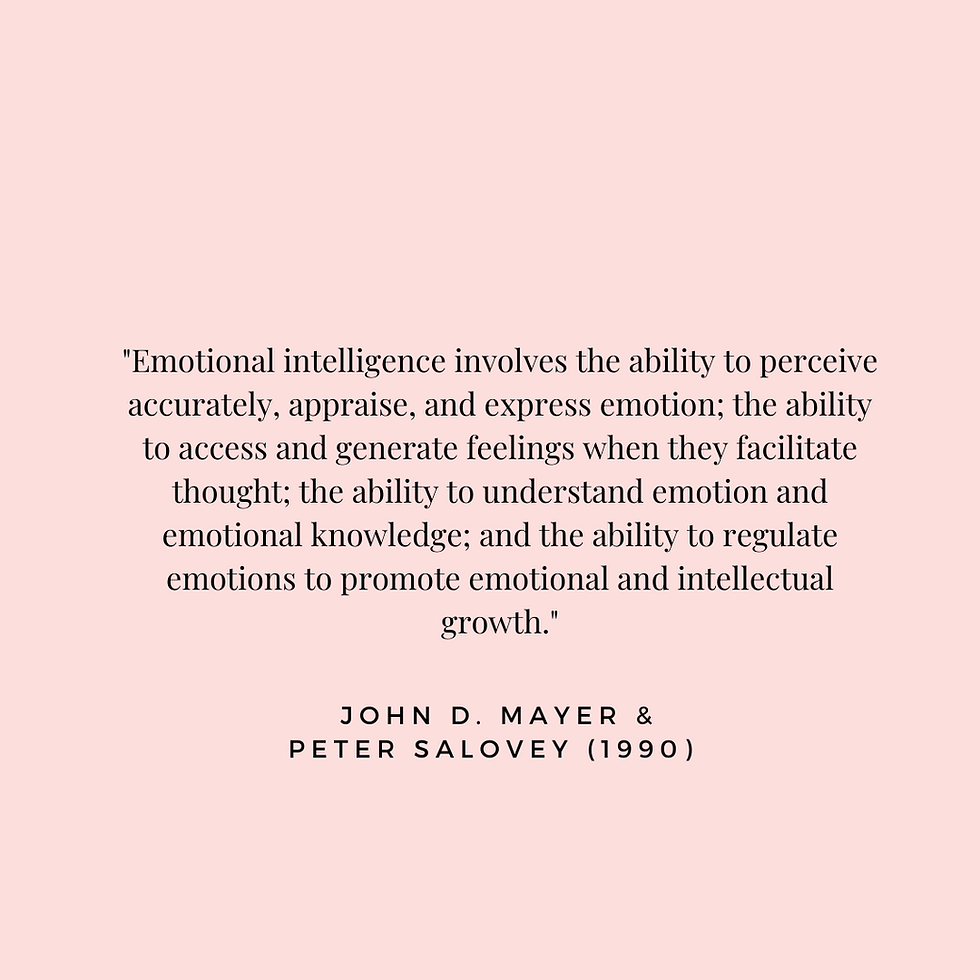Why Emotional Intelligence Still Matters (And What It Really Means)
- Midnight Musingz

- Jul 8
- 4 min read
"Emotional intelligence involves the ability to perceive accurately, appraise, and express emotion; the ability to access and generate feelings when they facilitate thought; the ability to understand emotion and emotional knowledge; and the ability to regulate emotions to promote emotional and intellectual growth." John D. Mayer & Peter Salovey (1990)
Let’s be real: we’ve all been told to "control our emotions" or "just be smart about it"—but what does that actually mean? Emotional intelligence (or EQ) is one of those buzzwords thrown around in job interviews, TED Talks, and LinkedIn posts. But when you strip away the jargon, emotional intelligence is simply about being aware of your emotions, understanding them, and knowing what to do with them—in your life, your work, and your relationships.
Psychologists John Mayer and Peter Salovey were among the first to really define it back in the 1990s. Their definition (quoted above) breaks it down into four parts. Let’s unpack them one by one in real-world terms—with some science and examples that actually make sense.
1. Recognizing and Expressing Emotions: The First Step to Not Screwing Up
This is about being able to notice emotions—in yourself and in other people—and being honest about them.
Imagine your friend says “I’m fine” after clearly being ghosted, but their voice sounds off, and they won’t meet your eyes. You can tell they’re not fine. That’s emotional intelligence at work: picking up on the clues behind the words.
It’s a superpower in relationships, workplaces, and even on social media. If you’re someone who picks up on when a coworker is overwhelmed or when your partner’s upset but not saying it out loud, you’re already using this skill. And if you're able to say, “Hey, I’m feeling a little anxious today,” instead of lashing out or shutting down—that's EQ in action too.
The Greek philosopher Socrates said, “Know thyself.” It turns out, knowing your feelings is the first step to knowing how to handle life.
2. Using Emotions to Think Better: Feelings Aren’t the Enemy of Logic
We often hear that emotions cloud judgment—but that’s not the full picture. In fact, emotions can help us think better if we know how to use them.
Let’s say you’re deciding whether to take a new job offer. Logically, everything lines up—but something feels off. That gut feeling? It’s your emotional brain telling you something your rational brain hasn’t caught yet. Neuroscientist Antonio Damasio found that people who couldn’t feel emotions (due to brain damage) actually struggled to make decisions. Emotions, it turns out, are part of how we think.
Think about how artists channel heartbreak into music or how founders like Steve Jobs used emotional intuition to create tech that wasn’t just smart but beautiful. As Jobs said, “Technology alone is not enough... it’s technology married with the humanities that makes our hearts sing.”
Emotions aren’t distractions. They’re data. They tell us what matters.
3. Understanding Emotions: Why You Need to Learn the Language of Feelings
There’s a big difference between feeling angry and knowing why you’re angry.
Maybe you’re snapping at your roommate, but deep down it’s not about them—it’s about your burnout at work or feeling stuck. Understanding your emotions means being able to break them down and trace them to their source.
Psychologist Lisa Feldman Barrett calls this emotional granularity—the skill of naming feelings precisely. Instead of just saying “I feel bad,” you might realize, “I feel disappointed,” or “I feel left out.” This helps you respond better, rather than reacting impulsively.
In activism, empathy, and conflict resolution, this skill is huge. Think of people like Martin Luther King Jr.—he didn’t just fight injustice, he deeply understood the fear, pain, and hope in the people around him. Emotional understanding builds bridges where arguments can’t.
4. Managing Emotions: Staying Cool Without Going Numb
This is where most people get it wrong. Managing emotions doesn’t mean bottling them up or pretending everything’s fine. It means finding ways to respond—not just react.
You know that feeling when you want to send a fiery text but decide to wait until you’re calmer? That’s emotional regulation.
Psychologist James Gross found that strategies like reframing (looking at a problem in a new light) work better than just suppressing feelings. For example, seeing a breakup not as failure but as a redirection gives you emotional strength, not just emotional silence.
Take someone like Nelson Mandela—he spent decades in prison, but he didn’t let anger define him. He channeled it into unity and change. That’s emotional intelligence at the highest level.
And on a personal level? Learning how to pause, breathe, and choose your response—whether it’s during a tough conversation, a stressful Zoom call, or a moment of self-doubt—is how we grow emotionally and mentally.
So, Why Should You Care About EQ Today?
Because emotional intelligence isn’t just some soft skill—it’s survival. In a world full of constant notifications, burnout, AI, and cultural shifts, your ability to understand your emotions and manage them is what keeps you grounded.
EQ helps you:
Communicate better in relationships and work
Handle conflict with less drama
Make decisions that align with your values
Take care of your mental health
Lead with empathy, not ego
It’s not about being “emotional.” It’s about being aware—and intentional.
TL;DR?
Emotional intelligence is about four things:
Recognizing emotions
Using emotions to think clearly
Understanding feelings deeply
Managing emotions with maturity
It’s a skill you build—not something you're born with. And in today’s messy, fast-moving world, it might just be the most underrated superpower you can have.
Want to explore how to build emotional intelligence in real life? I can help you develop a follow-up post on that too—let me know.



